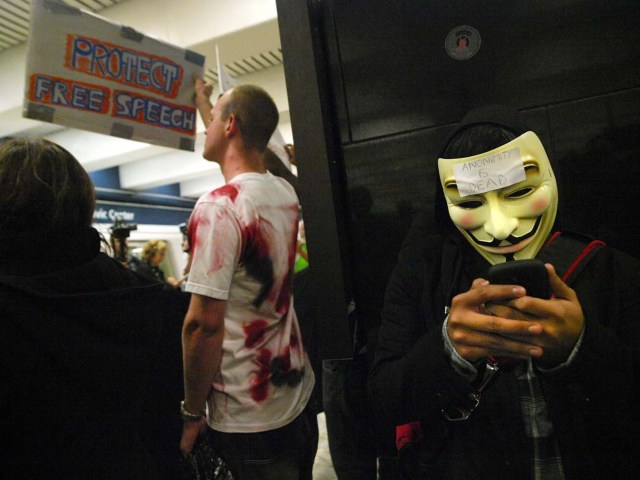The Bay Area Transit Police, amusingly known as BART, show that law enforcement still doesn’t understand the value — and challenges — of social media. The police force reacted to planned flash mobs — protests organized rapidly through social media platforms, Twitter foremost among them — by shutting down cell phone service in the BART stations. Hey, if you can’t talk to one another, how are you going to organize, right? Thank God BART wasn’t around when the Founding Fathers were trying to hammer out the U.S. Constitution. Perhaps the transit agency would have drummed the unruly bastards out of Philadelphia before they could dream up the First Amendment.
 You can understand why the transit police were frazzled. There is no question that social media has made communications easier, quicker and more effective. By and large, this is a good thing, put to good use by millions around the world daily. Unfortunately, there are people who put this new generation of communications to bad use, too. And the advent of flash mobs is an example of how social media can be used for hooliganism (I’ve always wanted to use that word) and criminal activity. Just look to Great Britain, where so-called protesters are protesting very little other than doors and windows as they smash them in and loot stores. Power to the people.
You can understand why the transit police were frazzled. There is no question that social media has made communications easier, quicker and more effective. By and large, this is a good thing, put to good use by millions around the world daily. Unfortunately, there are people who put this new generation of communications to bad use, too. And the advent of flash mobs is an example of how social media can be used for hooliganism (I’ve always wanted to use that word) and criminal activity. Just look to Great Britain, where so-called protesters are protesting very little other than doors and windows as they smash them in and loot stores. Power to the people.
However, social media — including flash mobs — is also used for noble causes and nonviolent protests. Just look to the Middle East and the Arab Spring. Look to Iran. Admittedly Iran was less flash and more of a truly spontaneous movement, but new tactics such as flash mobs will become increasingly common as protestors in authoritarian states seek ways to make their voices heard while minimizing persecution from state police.
What law enforcement, national security agencies and others in positions of power over civil liberties must understand is that while social media is a new medium of communication, it is still a medium of communication, protected by the Constitution. If the protests in San Francisco were violent and posed a threat to public safety, then BART had a duty to manage the situation and protect the public. Protestors have no inherent right to endanger the safety of commuters in a busy subway station any more than shout fire in a theater.
That said, they have every right to speak. (And frankly, to organize.) BART, or any other law enforcement agency does not have the authority to prevent speech by physical means — whether that means shooting the horses from underneath the riders of the Pony Express, intercepting and burning mail in the postal system, shutting down Internet connections to block email, physically cutting traditional phone lines or, in this case, shutting down cell phone service.
Protests — violent or nonviolent — are nothing new in American history. The story of the struggle for civil rights is largely a story of organized protests. And whether said protests are revolutionary struggles to advance the human cause or criminal threats to public safety sometimes depends on where you’re sitting. Birmingham, anyone?
Don’t get me wrong. I’m not saying the BART protests were the equivalent of the long struggle for equality in this country. Then again, I’m not saying it’s not. Candidly, I’m not all that familiar with the shooting that took place. I know it’s suspect that an unarmed homeless man was gunned down for allegedly trying to skip paying the transit fare, but I don’t know all the details. In terms of the protest itself, should the Bay Area transit police have taken action? The protestors claim their actions were nonviolent. The facts suggest differently. I’ll also leave the question alone for now. What I can tell you is that whatever action BART did take should have dealt with the actual protest and not with the lines of communications used to organize it.
Law enforcement must become more intelligent in its reaction to social media. And that’s what it is: reaction. What law enforcement really needs to do is proactively educate itself on social media and learn to use it to its advantage in a positive way. Social media can be a very effective tool for law enforcement – more than a place to simply post new releases, which is the way most agencies use the medium now.
In what many in the online world view as poetic justice, hackers recently broke into the BART system and leaked personal data about the police officers. This is no more ethical than BART’s efforts to shut down the First Amendment rights of San Francisco residents (using their own tax dollars no less). Some have pointed the finger at the notorious “hacktivist” group Anonymous. Anonymous — for some reason, nobody seems to know who they are — denies it. Who knows. What we do know is that the hacking certainly wasn’t a coincidence.
Rather than attempting to shut down the entire global Internet in order to control the hackers, I’d encourage BART to reconsider its policies. And then I’d urge them and the law enforcement community in general to get its head around social media.


